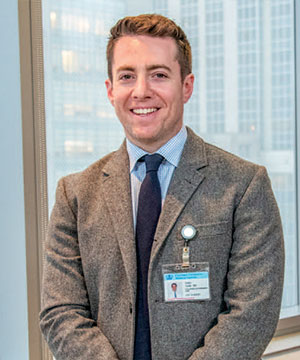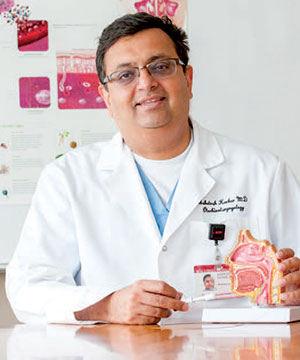Advancing Minimally Invasive & Skull Base Surgery

David A. Gudis, MD, Chief, Division of Rhinology and Anterior Skull Base Surgery, NewYork-Presbyterian/Columbia
NewYork-Presbyterian’s head and neck surgeons are leaders in the use of minimally invasive approaches – including transoral robotic surgery, salivary endoscopy, and transnasal skull base surgery – to remove tumors and obstructions of the salivary glands, mouth, throat, thyroid and parathyroid glands, larynx, and cervical spine. Our teams were among the first adopters of robotic techniques and continue to expand its applications across the field of otolaryngology.
Pioneering sialendoscopy. NewYork-Presbyterian/Weill Cornell is one of the few institutions offering salivary endoscopy, a highly technical procedure, to remove stones in the salivary glands – sparing patients from invasive open procedures on the parotid or submandibular glands, which raise the risk of nerve damage. They also use sialendoscopy to address salivary gland inflammation, such as that seen in patients with Sjögren’s syndrome – opening the obstructed duct with a balloon and stent and applying steroid treatment.
Expanding ear endoscopy. NewYork-Presbyterian/Columbia has a growing ear endoscopy program – the first in the New York metropolitan area – offering less invasive transcanal access to middle ear surgeries for otologic diseases (such as tympanic membrane perforations, conductive hearing loss, and small cholesteatomas) that would otherwise require a larger incision to remove tissue blocking the surgical site. In concert with carefully executed surgical maneuvers, the endoscope offers a number of advantages for select ear surgeries.
Leaders in skull base surgery. NewYork-Presbyterian surgeons are among the world’s leaders in the use of transnasal and transoral endoscopic approaches in children and adults, leaving the patient with no visible incisions. Our surgeons are experienced in the full range of endoscopic skull base procedures, including Ashutosh Kacker, MD, otolaryngologist and skull base surgeon, NewYork-Presbyterian/Weill Cornell Advancing Minimally Invasive and Skull Base Surgerythe treatment of sinus and nasal cancers, pituitary tumors, neuropapillomas, Schwannomas, dermoid cysts, angiofibromas, cervical vertebral dislocation causing compression of the spinal cord, and Chiari malformation. ENT surgeons and neurosurgeons work side by side to access these delicate areas.

Ashutosh Kacker, MD, otolaryngologist and skull base surgeon, NewYork-Presbyterian/Weill Cornell
Advanced parathyroid surgery. NewYork-Presbyterian/Weill Cornell is a leader in the use of imaging to guide parathyroid surgery. They employ high-sensitivity four-dimensional computed tomography/ultrasound to localize abnormal parathyroid glands, without the need for full surgical opening of the neck. The program is one of the first of its kind in the country, offering an approach that can spare patients from unwarranted surgery.
Specialized reconstruction. For patients who require open surgery, our reconstructive surgeons collaborate with facial and plastic surgeons, performing flap procedures to preserve function and cosmesis.



